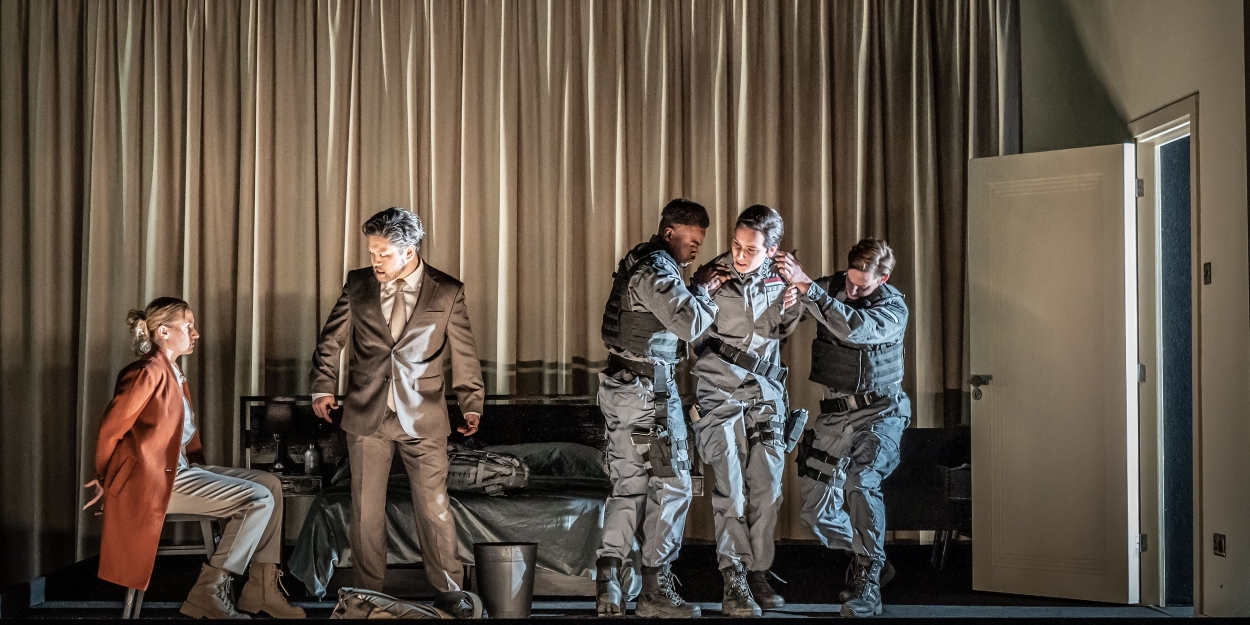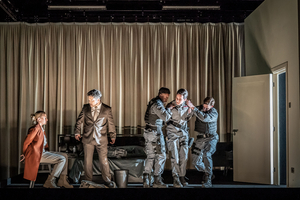

![]() While Handel's Arminio contains the odd earworm and gorgeous piece of music, it's perhaps not surprising that it's not one of his most performed operas. When paired with a production that emphasises monochromatic melancholy with singers who do their best despite swimming in an ocean of drab uniforms and casual attire, it results in a general performance that is more miss than hit.
While Handel's Arminio contains the odd earworm and gorgeous piece of music, it's perhaps not surprising that it's not one of his most performed operas. When paired with a production that emphasises monochromatic melancholy with singers who do their best despite swimming in an ocean of drab uniforms and casual attire, it results in a general performance that is more miss than hit.
That's not to say that the production is without its merits. Musically there is a lot to like: conductor André Callegaro skilfully directs the Early Opera Company orchestra in a movement that brings Handel's music to life, and the performers are generally capable - it's just the production that feels grey and beige.
The absolute commitment to seriousness is perhaps the most glaring problem. Handel's operas are always full of drama and thrills, but he never fails to breathe subtle irony into them. The audience knows and laughs occasionally at the lyrics, but this is despite director Mathilda du Tillieul McNicol's instructions, not because of them. In this version, everything is serious.
The plot features the titular Germanic chieftain Arminio (Gabrielė Kupšytė), who is discovered to be a traitor to the Roman Empire when he returns to Germania. The story contains everything from love triangles and betrayal to political intrigue and culminates in his victory with his wife, Tusnelda (Sarah Dufresne), against the Romans. His rival Varo (Michael Gibson) is killed in battle.
Noemi Daboczi's contemporary costumes and sets feature an office space for the Roman occupants and a bedroom where Arminio spends much of the runtime awaiting his sentencing to death. There's nothing wrong with a contemporary setting at all, but McNicol's vision generally plays it safe, and in doing so, it doesn't really do anything beyond being contemporary. Roman soldiers wear uniforms and carry rifles; non-soldiers wear casual clothing.
Nevertheless, the singers work with what they have, and they generally outshine the production. While they are given little to work with acting-wise, musically their performances range from competent to outstanding. Kupšytė's Arminio is strong throughout, which is difficult to pull off with all of the woe-is-me arias, but she always keeps it fresh and interesting, bringing in enough lament while in captivity and gusto when at war.
She's paired well with Dufresne's Tusnelda in a performance that is dramatically pristine and engaging and always pleasant to hear. Josef Jeongmeen Ahn's Segeste, too, is full of energy and wonderfully dry to match his character.
As such, there are plenty of things to like about this production of Arminio - it's just a pity that the production itself is generally lacklustre. Still, it's a decent success and worth a visit.
Arminio is at Royal Opera House until 6 May.
Photo Credit: Marc Brenner
Reader Reviews
Videos

